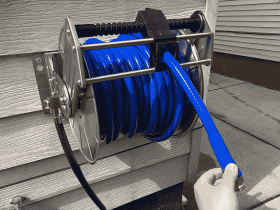The changing seasons always bring a new list of home maintenance and DIY jobs to focus on. Summer projects might seem less obvious than winterizing your home but are just as vital, especially if you live in a hot, arid climate or your area is increasingly prone to prolonged dry spells.
To keep your home safe, attractive and fully functional throughout the season, here are some crucial maintenance tips for dry summers.
Why Dry Summer Maintenance Matters
Droughts are becoming more frequent and intense and lasting longer in many parts of the U.S., especially in the West. Long periods of dry weather cause parched soil to shrink, which can lead foundations to crack or settle unevenly. Your landscaping will also suffer in the arid weather. Paintwork may peel, garage doors may malfunction, and your HVAC will need servicing.
Multiple studies have shown that wildfires are increasing in frequency, duration and ferocity, so if you are expecting a dry season, fireproofing should also be an essential part of your summer maintenance.
1. Protect Your Foundation
Avoid foundation issues by conducting an inspection. Check for cracks in interior and exterior walls, gaps between the foundation and walls, or doors that stick. If you find problems, consult a specialist about how to proceed. To prevent problems in the first place:
- Apply mulch around your foundations to help retain soil moisture.
- Water nearby vegetation, particularly large trees or shrubs, to prevent them from drawing too much moisture away from your foundation.
- Remove thirsty plants that are close to your home, and consider planting drought-tolerant vegetation instead.
- Consider using soaker hoses or drip irrigation to water the soil directly around your foundation.
Read more:
- What are the 2 types of housekeeping?
- Quiz: Poor housekeeping exposes workers to several types of hazards.
2. Maintain Exterior Paint and Siding
Exterior paintwork can be badly affected by prolonged dry heat.
- Inspect for peeling or blistering paint.
- Repaint or touch up paintwork to prevent sun and heat damage.
- Choose white or pastel-colored paints to reflect heat away from your home.
3. Maintain Your Garage Doors
Arid weather can impact how well your garage door operates. To keep it running smoothly:
- Regularly use a silicone-based lubricant on springs, rollers, hinges and tracks. Hot, dry weather can dry out lubricants, leading to increased wear and tear.
- Inspect for gaps around the doors, and seal them as necessary. Worn weatherstripping allows hot air and dust to enter.
- Check the sensor alignment and clean it if required since dust and heat can affect garage door sensors.
4. Safeguard Your Landscaping
Your yard will likely be where you see the most visual impact from the dry weather. For a quick fix, use mulching to help protect your plants from wilting. If dry summers are becoming normal for you, however, think about more long-term solutions:
- Plant drought-resistant grasses and shrubs.
- Avoid water features unless they use recirculated water.
- Raise your lawn mower blade to at least 3 inches to encourage the grass roots to retain moisture.
- Consider installing a drip irrigation system.
- Use windbreaks, awnings or other structures to protect plants from direct sunlight and drying winds.
- Landscape creatively with stones, gravel or rocks to reduce the number of plants you need.
5. Take Fire Safety Precautions
Even if you are not in a wildfire-prone area, hot, dry summers are inherently a fire risk. Think ahead and take preventive measures to safeguard your home:
- Clear away debris and dry brush. To minimize the fire risk, aim for 30 feet of defensible space around your home.
- Store flammable materials safely and outside the home where possible.
- Clean and remove debris from your roof and gutters to avoid fire from windblown embers.
6. Improve Energy Efficiency
In the heat, there are steps you can take to cut your cooling bills and conserve water:
- Replace your HVAC filters and schedule a maintenance visit.
- Fix leaks in your faucets and waterlines.
- Collect water in rain barrels to use for irrigation.
- Inspect window and door seals and caulking to prevent cool air loss.
- Consider using solar shades on your windows to block heat penetration. Reflective film or honeycomb shades can also be effective.
Home Maintenance for Dry Summers Is Important
By following these tips, you can keep your home in tip-top condition even during drought conditions or prolonged hot, dry spells. If you are in a drought-prone area or at risk from wildfires, consider the suggested longer-term strategies to protect your home and stay safe in the summer heat.











Leave a Review